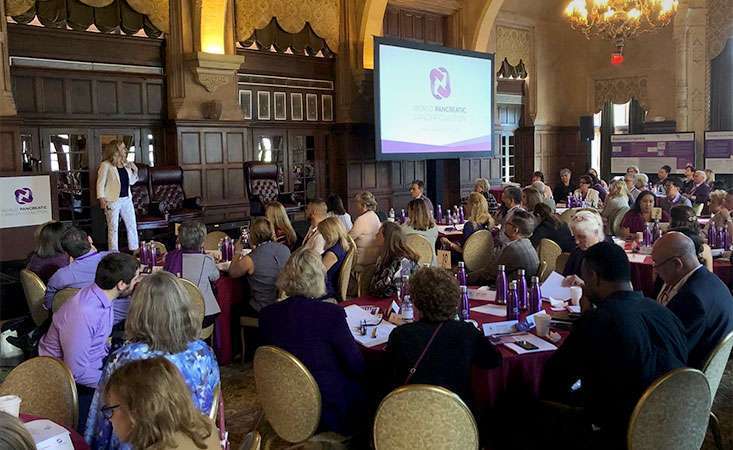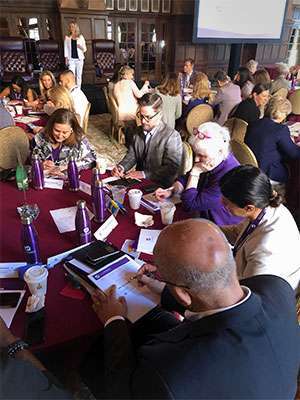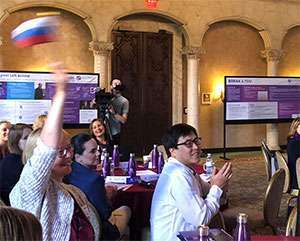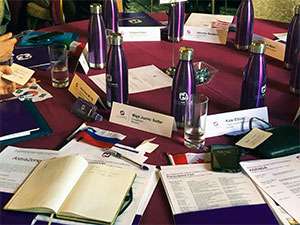
Julie Fleshman, PanCAN president and CEO as well as chair of the World Pancreatic Cancer Coalition steering committee, welcomes nearly 50 pancreatic cancer organizations from around the world to Florida for the Coalition’s annual meeting May 7-9, 2019.
This week 49 organizations from around the world, including the Pancreatic Cancer Action Network (PanCAN), are gathering in Coral Gables, Fla., for the fourth annual World Pancreatic Cancer Coalition (WPCC) meeting – the largest international assembly of pancreatic cancer patient advocacy groups.

A working meeting during the WPCC annual meeting in Coral Gables, Fla.
WPCC members convene to share their experiences and expertise, working together to achieve transformational change for all those affected by pancreatic cancer.
More than 100 people from 21 countries, including the United States, Czech Republic, South Korea, Australia, Hungary and Israel, are discussing the Coalition’s achievements, the global science perspective of pancreatic cancer and new best practices for treating the disease, among other topics.
PanCAN is a founding member of the Coalition, and PanCAN President and CEO Julie Fleshman, JD, MBA, serves as chair of the WPCC. Fleshman shared the achievements of the Coalition, which launched in May 2016 with its first annual meeting, after opening remarks by executive leadership of Let’s Win! Pancreatic Cancer Foundation.
“Welcome to the WPCC annual meeting and the largest attendance we’ve had here to date,” Fleshman said as she addressed the crowd. “The purpose of the Coalition is to raise global awareness about the disease, but just as importantly, it’s about strengthening the capacity of each of our individual efforts in order to make a powerful global impact. By working together, we will accelerate progress.”

Every country in attendance had a flag to wave proudly during introductions at the opening remarks on May 8, 2019.
Pancreatic cancer is the third leading cause of cancer-related death in the United States with a five-year survival rate of just 9 percent.
According to predictions from the International Agency for Research on Cancer (IARC), nearly half a million people worldwide will be diagnosed with pancreatic cancer this year. This also represents an alarming prediction of more than 430,000 pancreatic cancer deaths in the next five years.
“These statistics are not acceptable,” said Jenny Isaacson, vice president of strategic partnerships and projects for PanCAN and one of the meeting organizers. “Those 430,000 people are our family members, friends and colleagues. This is what drives all the WPCC member organizations to continue learning from each other and implementing this valuable information globally. We have to work together to overcome this disease.”
She added, “Sharing best practices and new learning through the WPCC members is crucial to improve patient outcomes in this disease. The more we come together and share, the faster we’ll see progress in pancreatic cancer patient outcomes.”

WPCC annual meeting May 7-9, 2019.
A panel discussion about the science of pancreatic cancer from a global perspective, streamed on Facebook Live, was then presented. WPCC member Barbara Kenner, PhD, founder of the Kenner Family Research Fund, served as moderator. Talia Golan, MD, of Phase 1 Program and Sheba Pancreatic Program at Chaim Sheba Medical Centre in Israel, served on the panel alongside Diane Simeone, MD, of Perlmutter Cancer Center/NYU Langone Health. Simeone is also chair of PanCAN’s Scientific and Medical Advisory Board.
The meeting will host in-depth workshops to share new best practices for treating the disease, including topics like supporting pancreatic cancer patients and understanding clinical trials. Cassadie Moravek, associate director of clinical initiatives at PanCAN, was a co-presenter during the clinical trials-focused workshop.
“There is still so much important work to be done,” Isaacson said. “The WPCC meeting invigorates everyone with new hope and information. This Coalition is very special – working together on pancreatic cancer on this scale will make crucial steps forward to improved outcomes for patients everywhere.”















